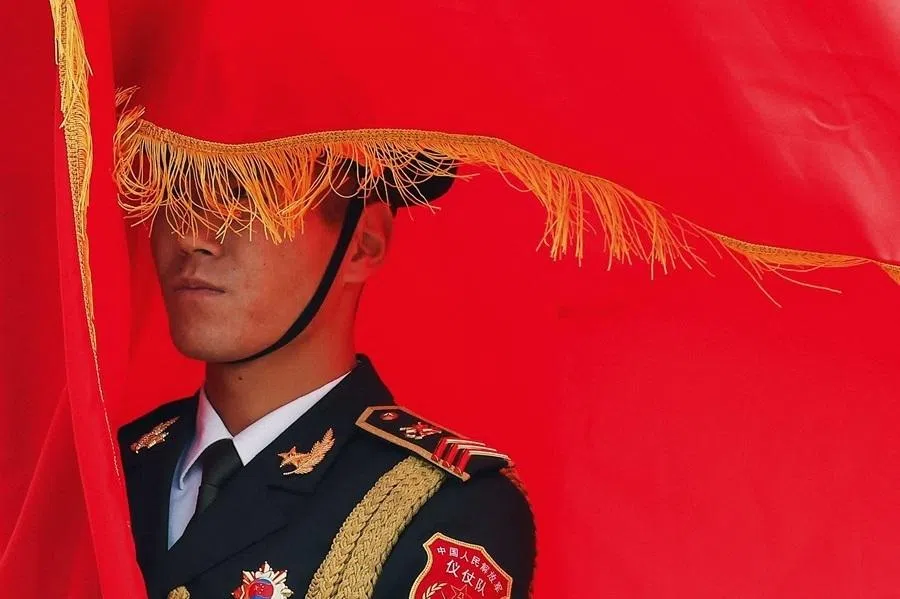Bangladesh is burning and it’s a worry for the region
Indian academic Rishi Gupta explains why Bangladeshi Prime Minister Sheikh Hasina’s downfall is not a sudden development but an outcome that has been simmering since 2018. In the aftermath, Bangladesh’s neighbours such as India, China and Myanmar will have to manage spillover effects and instability in the region.
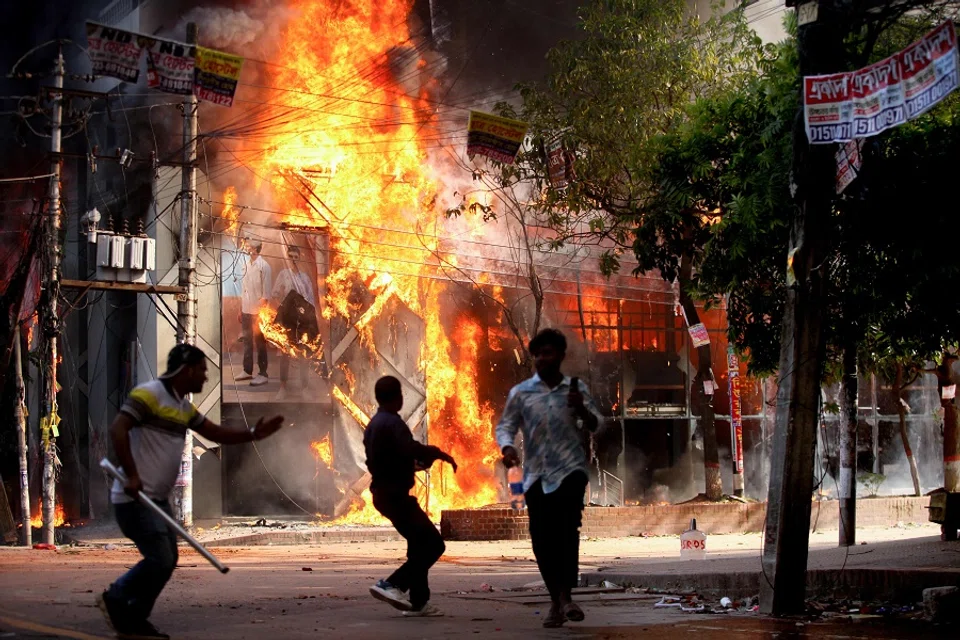
In less than seven months of parliamentary elections in Bangladesh, the country has entered the worst political crisis since its independence in 1971. Prime Minister Sheikh Hasina has resigned from office and fled to India. She may move to London as her final destination. Hasina won a record fourth consecutive term in January 2024, when she was accused by the opposition and the international community, including the US, of failing to uphold democratic principles by failing to hold fair elections.
General Waker-Uz-Zaman, chief of the Bangladeshi Army, announced the resignation of Prime Minister Sheikh Hasina while addressing students, politicians, activists and protestors on 5 August in the national capital, Dhaka. The army-backed political front is expected to form an interim government. For the past three weeks, Bangladesh has been at the centre of student protests demanding Prime Minister Hasina’s resignation following her proposal to reserve 30% of government jobs for the families of veterans of the 1971 Liberation War. The Hasina government accused the Students Against Discrimination — a student body formed in response to the anti-quota system — of orchestrating the protests at the tunes of anti-national elements.
There remains little doubt that Sheikh Hasina and her party, the Awami League, have lost the ground. However, this is not a sudden development but a product of a silent political opposition growing against her since 2018.
So far, more than 300 hundred protestors have died in clashes with the army and otherwise, along with a dozen security personnel losing lives. With the military in complete control of the country, it is unlikely that Sheikh Hasina will return to the country anytime soon. There remains little doubt that Sheikh Hasina and her party, the Awami League, have lost the ground. However, this is not a sudden development but a product of a silent political opposition growing against her since 2018. Prime Minister Sheikh Hasina has ruled the country since 2009. During her tenure in office, the country saw exponential economic growth, especially in industries like garment manufacturing.
What led to Sheikh Hasina’s downfall?
Hasina’s third term (2019-2024) was all about her rise as an authoritarian leader. Fearing that she might face anti-incumbency in the December 2018 parliamentary elections, almost all leaders of the main opposition — the Bangladesh Nationalist Party (BNP), including former Prime Minister Khaleda Zia, were jailed on the charges of corruption and anti-national activities. Following the absence of all top opposition leaders, BNP decided to boycott the 2018 elections, resulting in Hasina winning the majority. A similar situation was seen during the 2024 elections. While Sheikh Hasina may have won the elections for the third and fourth time, the political opposition against her was silently brewing.
With Hasina out now, BNP supporters are empowered, and extremist outfits like Jamat-e-Islami may resurge on the political map.
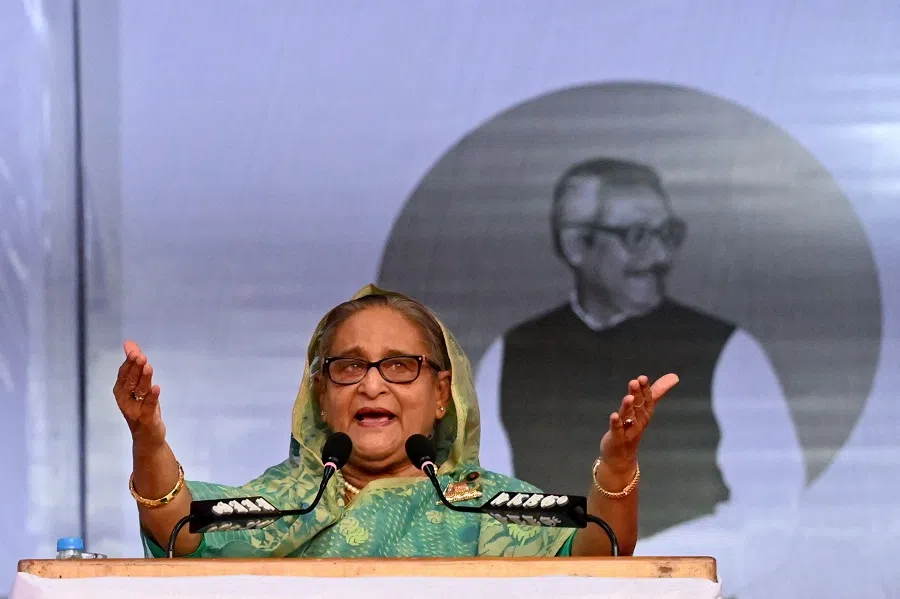
Hasina was criticised by international human rights organisations and democracies worldwide, including the US, for failing to hold free elections. In a strong statement soon after the election results in January 2024, the US State Department observed that the elections “were not free or fair, and we regret that not all parties participated” and urged the government of Bangladesh to “credibly investigate reports of violence [during elections] and to hold perpetrators accountable”.
At least five factors led to the final tipping point. One, Sheikh Hasina’s disregard for the opposition. Since its independence from Pakistan in 1971, Bangladesh has seen greater Islamic extremism, including the rise of parties like BNP and Jamat-e-Islami. In the last five decades, Bangladesh’s electorate has made their choice between the BNP and the Awami League. Despite being an Islamic country, Bangladesh has been a culturally rich and liberal society, which the Awami League represented mainly under secularism. Sheikh Hasina’s father, Sheikh Mujibur Rahman, the “father of the nation”, had initiated an armed rebellion against the brutalities of the Pakistani army in 1971 with the support of India and freed the country, and was known for championing secularism.
Hasina tried using her father’s legacy to keep her political capital intact. Thinking that her secular and liberal outlook against the extremist Islamic parties would continue to keep her in power was misjudged because this outlook was not supported by a democratic political exercise but rather by suppressing the opposition. Had Hasina been fairer in holding elections and letting voters decide whether to bring the Islamic party back to power, the situation may have been different. With Hasina out now, BNP supporters are empowered, and extremist outfits like Jamat-e-Islami may resurge on the political map.
Second, Hasina’s tight control of democratic institutions, including the judiciary and Election Commission. Not that she is the only post-independence Bangladeshi leader who has tried to do so, but what was pressing in her case, was her attempts to wipe out any opposition voices from the political turf. These voices certainly went underground, but they did not vanish.
Third, Hasina’s government had been marred by corruption, and her failure to curb it exhibited a close nexus between the Awami League and the government officials involved in such practices. In 2021, an Al Jazeera exposé claimed to have the story on then chief of army staff General Aziz Ahmed, who was given a free hand by Hasina and was reportedly involved in corrupt practices, including defence procurements.
... while Bangladesh’s economic trajectory is credited to Hasina, the darker side of it exposes brimming unemployment among the youth.
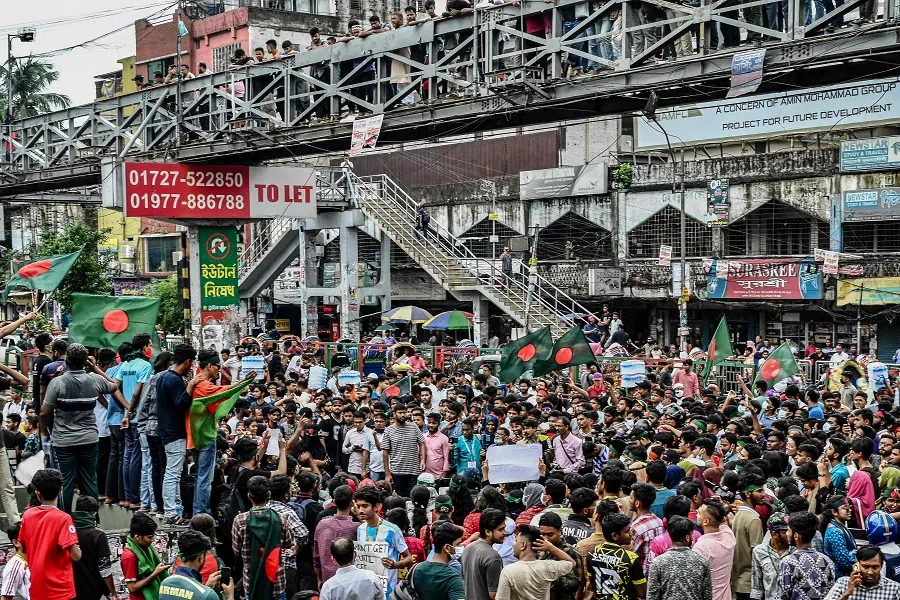
General Aziz also managed a clemency against his brother’s death sentence in several cases of murders and arson. Despite international pressure, Aziz was not removed by Hasina and continued as the chief of the army staff. In May 2024, Aziz was sanctioned by the US State Department for his “significant corruption.” This scandal further eroded public trust in Hasina’s administration and highlighted systemic issues within her government.
Fourth, while Bangladesh’s economic trajectory is credited to Hasina, the darker side of it exposes brimming unemployment among the youth. A country with a fairly young population has been unable to keep them in schools. At the same time, increasing unemployment has put their futures at risk. As per the Bangladesh Bureau of Statistics (BBS), there was a surge of 3.51% in unemployment in the first quarter of 2024, with an estimated 2.59 million unemployed individuals and more individuals migrating abroad for employment, mainly to the Middle East, where they are reported to work under harsh conditions. Hasina’s failure to generate employment and prevent brain drain has been a perennial challenge.
Fifth, Hasina’s unwillingness to hold open dialogues with the protestors in the last few weeks, especially with those having genuine demands. For a country where youth and students were at the forefront of the war in 1971, underestimating their demands and keeping away from them has come at a price for her. Lately, Bangladesh has also seen press freedom being curtained, the internet being shut down, and a curfew imposed, all at the same time. What was manageable in the early days of the protest mounted to become a movement against Hasina, which finally resulted in her ouster.
... BNP and Jamat-e-Islami are known for their anti-India stance, and with their alleged closer ties with Pakistan, cross-border terrorism via the Bangladesh-India border may well pose a security risk to India.
Implications for India, China and Myanmar
To observers in India, Sheikh Hasina’s landing in Delhi on 5 August 2024 was no surprise — after all, she has been a friend of India. Not to forget, today’s Bangladesh was part of an undivided India until 1947, which, after India’s partition in 1947, became part of Pakistan. It later sought independence from Pakistan through India’s help and became independent in 1971. Hasina has not only been accommodating to India’s security concerns but has also welcomed Indian investments and exports wholeheartedly. However, as the next-door neighbour, sharing a long border with Bangladesh, India has its worries about the spillover impacts of the violent turnaround of events in Bangladesh.
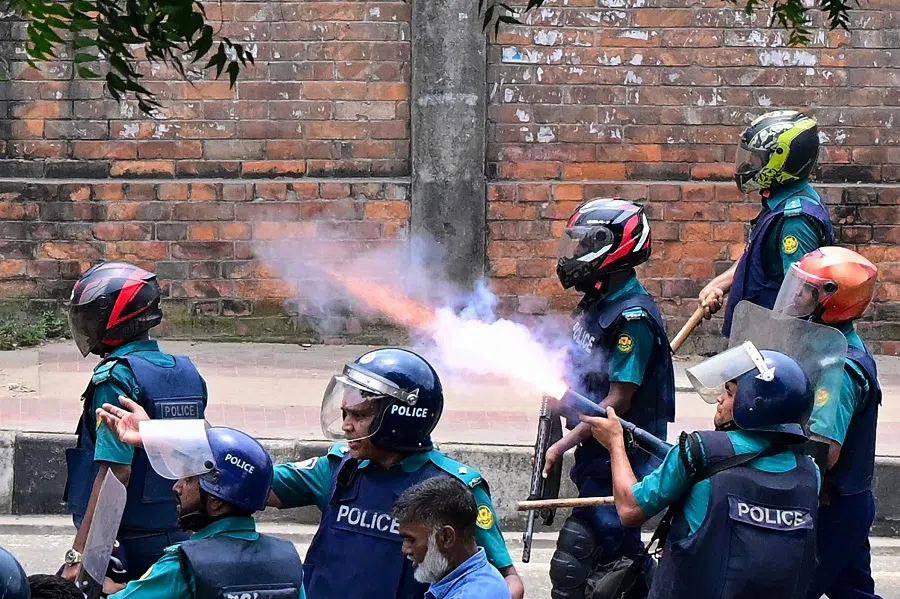
Knowing that she stood on volatile political ground, Hasina made two back-to-back trips to India — first to attend Prime Minister Modi’s third-term inauguration on 9 June and then taking up her first state visit to India in the same month, seeking support from Delhi. Her fears of growing political opposition within the country were quite visible from her two trips to Delhi in one month. Meanwhile, the opposition in Bangladesh seemed unhappy with Delhi for its reported “interference in the domestic affairs of the country”. Delhi was also credited with Hasina’s fourth consecutive term, resulting in an “India Out” campaign across Bangladesh by the opposition.
As Hasina waits for her asylum confirmation from the UK, India will have to be watchful of the anti-India activities in Bangladesh and at the Bangladesh-India border. BNP and Jamat-e-Islami are known for their anti-India stance, and with their alleged closer ties with Pakistan, cross-border terrorism via the Bangladesh-India border may well pose a security risk to India. Also, what India witnessed 50 years ago was the migration of millions of Bangladeshi Hindus, fearing Islamists may kill them, fleeing to the Indian state of West Bengal, which may again be a challenge for Delhi to manage, which may further exacerbate the security situation for India.
Also, 50 years ago, during the 1971 war, millions of Bangladeshi Hindus fled to West Bengal, India, due to fears of Islamist violence. The Indian state of West Bengal was a natural refuge due to its proximity and cultural ties with Bangladesh. This mass migration strained resources and impacted regional stability. Today, a similar situation could pose significant challenges for Delhi and exacerbate India’s security concerns. And not to forget, Pakistan to date has difficulty in accepting that they lost the war against the Indian Army. Islamabad may want to use the volatile situation to carry out vengeance against India.
On the other hand, China will have its worries, considering that it has huge stakes and investments in Bangladesh. In 2023, Chinese investments in Bangladesh were reported to have reached US$ 1.4 billion, with 700 Chinese companies present there and generating approximately 550,000 jobs. More importantly, China has active investments under the Belt and Road Initiative, especially in the infrastructure development sector. China also stands as one of Bangladesh’s largest trading partners. China seeks strategic influence in Bangladesh due to its access to the Indian Ocean and its role in facilitating the Belt and Road Initiative.
While China may not directly like to comment on the situation, except noting the developments, it will have a major challenge towards protecting its investments and stability for the ongoing projects in Bangladesh.
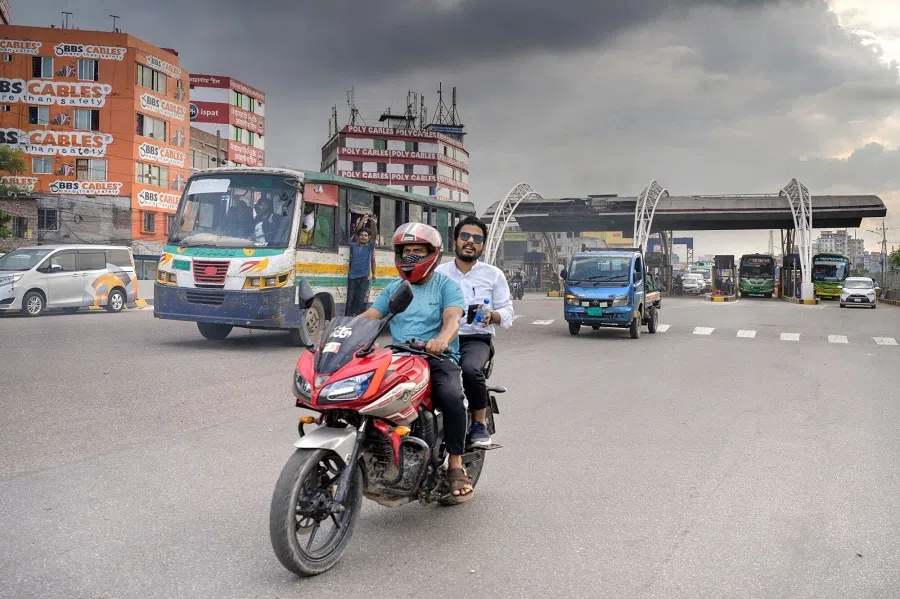
Bangladesh serves as a potential trade hub linking China with South and Southeast Asia, and its proximity to India’s northeastern states offers China strategic leverage. Strengthening ties with Bangladesh also helps China secure energy resources and expand its influence in Asia. While China may not directly like to comment on the situation, except noting the developments, it will have a major challenge towards protecting its investments and stability for the ongoing projects in Bangladesh.
Additionally, Bangladesh shares a long border with Myanmar and is host to the largest Rohingya refugee population. While Hasina opted for a humanitarian approach towards the refugees while seeking international support for their repatriation to Myanmar, a military-led/backed government might adopt a more hardline approach, potentially prioritising border security and national interests over refugee welfare. This may well result in another humanitarian crisis where the army may forcibly repatriate the Rohingyas without adequate assurances of their safety in Myanmar.
To conclude, as the situation in Bangladesh continues to evolve, anything and everything that follows will affect not only the future of Bangladesh but also the entire region in terms of stability and peace. Countries in the region, including Nepal, Sri Lanka, Pakistan and Afghanistan, continue to witness political volatility, and it is no wonder that they are seeing something on such lines again. However, these developments raise pressing questions about whether electoral systems in democracies are oriented towards the public or are self-centric as the ruling parties manipulate them. Bangladesh often highlights the stark vulnerabilities of democracies, revealing their limitations and areas needing improvement.



![[Big read] When the Arctic opens, what happens to Singapore?](https://cassette.sphdigital.com.sg/image/thinkchina/da65edebca34645c711c55e83e9877109b3c53847ebb1305573974651df1d13a)

